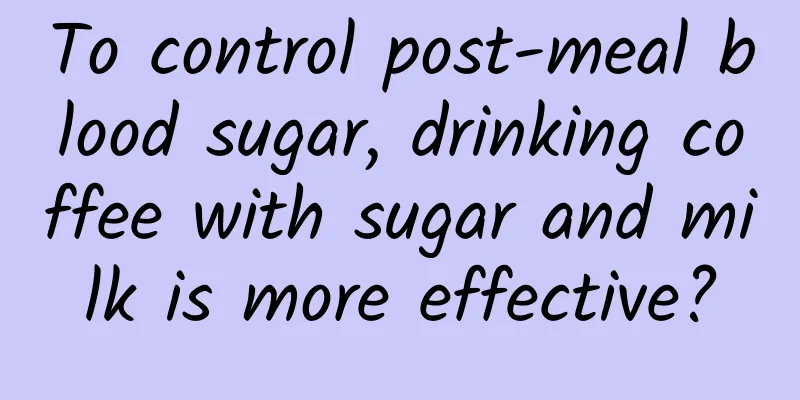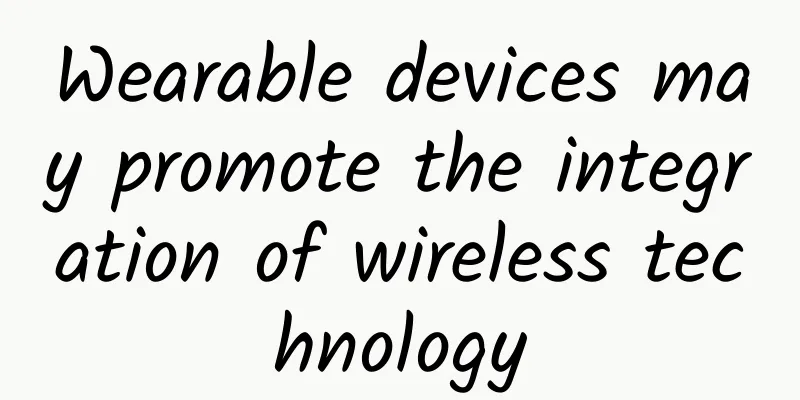To control post-meal blood sugar, drinking coffee with sugar and milk is more effective?

|
In recent years, many weight loss diets have recommended drinking black coffee in the morning, on the grounds that it can increase the metabolic rate and help with weight loss. Many medical experts also recommend drinking coffee, arguing that it helps control blood sugar and prevent diabetes. (There are many epidemiological research papers, which can be found in scientific news online, so I won’t list them all here.) However, some people may have a feeling: my stomach really can't stand drinking black coffee on an empty stomach. Some people feel stomach acid discomfort, some feel stomach pain, and some even experience hypoglycemia, palpitations and tremors. If you drink coffee with sugar and milk, you will feel much better. Most people can accept it. However, if sugar and milk are added, will the benefits of coffee still exist? Will it increase blood sugar or even make you fat? A new study has solved this dilemma for people. The study shows that drinking a cup of coffee with sugar and milk first thing in the morning before eating breakfast may be more conducive to controlling post-meal blood sugar [1]. In this study, healthy subjects of normal weight who drank coffee in the morning were given a cup of decaffeinated coffee with sugar and milk (not creamer!) 60 minutes before breakfast, 30 minutes before breakfast, or after breakfast. This sweetened and milky coffee contains 2.4 grams of protein and 11 grams of carbohydrates, of which 7.5 grams come from added sugar and the rest come from milk and coffee itself. There are only 7.5 grams of added sugar in 200 ml of coffee. The sweetness is very, very light, almost non-existent, and it just balances the bitter taste of the coffee. It is definitely not a very sweet coffee drink. Compared with eating breakfast without coffee and drinking this cup of coffee after the meal, drinking this cup of coffee with sugar and milk 30 minutes before breakfast can significantly reduce the peak blood sugar level after the meal. The effect is really considerable - the peak blood sugar level 30 minutes after breakfast is reduced by nearly 2 mmol/l. Drinking it 60 minutes in advance also has a certain effect, but it is obviously not as remarkable as drinking it 30 minutes in advance. In other words, drinking coffee with sugar and milk in advance can make the post-meal blood sugar response of breakfast more stable . Previous studies by the research team have found that drinking pure black coffee before a meal does not effectively reduce the post-meal blood sugar peak. Many people may wonder: Why? Isn't it better to have less sugar and fat? Why does adding sugar reduce the blood sugar response after a meal? In fact, consuming a small amount of carbohydrates within 30 to 60 minutes before a meal is beneficial to post-meal blood sugar control. This effect is nothing new and has been confirmed by many studies. Eating an apple[2], dried apples[3], drinking yam porridge[4], eating rice[5], or a cereal energy bar[6] 30 minutes before a meal can all help to stabilize blood sugar levels after a meal. That is to say, before a meal, consuming some carbohydrate-containing foods in advance, of which the amount of usable carbohydrates is only 10 to 15 grams, can improve the body's glucose metabolism and enhance the body's ability to process blood sugar . "Eating carbohydrates to lower blood sugar" is not a fantasy. For example, eating an apple 30 minutes before a meal can significantly reduce the blood sugar response after a meal by 50%. In the experiment, sugar water with the same sugar composition as apples was used as a control treatment, confirming that about half of the effect of apples in smoothing blood sugar response can be attributed to the sugar in apples, and the remaining half is speculated to come from other beneficial ingredients in apples, such as pectin and polyphenols [2]. However, it is necessary to eat/drink carbohydrates 30 minutes before eating the main meal to achieve the effect of controlling blood sugar. If you eat right after eating, the effect of reducing postprandial blood sugar fluctuations is not obvious. In comparison, eating half a bowl of vegetables before starting to eat the main meal is more effective in controlling postprandial blood sugar[7]. However, why does eating carbohydrate-containing foods 30 minutes in advance have such an effect on improving postprandial blood sugar? The principle is still unclear. But at least this effect does not come from excessive insulin release . Because the study found that if the total carbohydrate intake remains unchanged, drinking sugar water or eating fruit before a meal will not increase the insulin peak or the total amount of insulin released. It may be that it slows down the digestion rate, increases the insulin sensitivity of the liver, or improves the secretion pattern of incretin, which requires further research and exploration. In addition, eating some protein foods before meals can also help, such as drinking a glass of milk or soy milk[8], drinking a glass of nut oilseed milk[9], drinking a glass of whey protein powder[10], etc., which can more or less have the effect of stabilizing post-meal blood sugar. The mechanism has been preliminarily explored, and it may be that the secretion of incretin peptides such as GLP-1 is increased. Drinking milk first and then eating bread 30 minutes later will have a greater effect on lowering blood sugar levels after a meal. Of course, if you don’t have time to drink milk in the morning, drinking milk with bread will also result in a significantly lower blood sugar response than eating bread alone [8]. For people who cannot drink milk, drinking soy milk, nut oil seed milk and other milk alternatives can also be effective . According to existing research results, among various nut oil seed milks, soy milk mixed with flax seeds and soybeans has the best effect in suppressing postprandial blood sugar response, and can reduce the GI value of the same bread from 74 to 56. If soy milk is used, it can be reduced to 63[9]. Another problem with black coffee is that it is very irritating to the stomach . I have found that many students seek medical treatment for stomach problems, partly because of irregular meals, and another reason may be related to long-term drinking of black coffee and various teas on an empty stomach. Therefore, if you want to drink a cup of coffee for breakfast, you can add milk and sugar without worrying about it. Doing so is not only good for blood sugar, but also better for your stomach, and you can also better enjoy the delicious taste of light sweet coffee. References: 1 Wong THT et al. Consumption of decaffeinated coffee with milk and sugar added before a high-glycemic-index meal lowers postprandial glucose surge when compared with consuming it after the meal. Human Nutrition & Metabolism, 2021, 24, 200124 2 Lu J, et al. Apple preload halved postprandial glycaemic response of rice meal in healthy subjects. Nutrients, 2019, 11: 2912 3 Zhao W, et al. Co-ingested Vinegar-soaked or Preload Dried Apple Mitigated Acute Postprandial Glycemia of Rice Meal in Healthy Subjects on Equi-carbohydrate Basis. Nutrition Research, 2020, 83(11):108-118 4 Zhao W, et al. Yam paste in glycemic preloads curbs peak glycemia of rice meals in apparent healthy subjects. The Asian and Pacific Journal of Clinical Nutrition. 2021; 30(3): 436-445 5 Lu X, et al. Both Isocarbohydrate and Hypercarbohydrate Fruit Preloads Curbed Postprandial Glycemic Excursion in Healthy Subjects. Nutrients. 2021, 13: 2470. 6 Johnston CS, et al. The effect of peanut and grain bar preloads on postmeal satiety, glycemia, and weight loss in healthy individuals: an acute and a chronic randomized intervention trial. Nutrition Journal, 2013, 12:35 7 Zhu R, et al. Acute Effect of Non-homogenized and Homogenized Vegetables Added to rice based meals on Postprandial Glycaemic Response and in vitro Carbohydrate Digestion. British Journal of Nutrition 2018, 120, 1023–1033 8 Sun L, et al. Impact of preloading either dairy or soy milk on postprandial glycemia, insulinemia and gastric emptying in healthy adults. European Journal of Nutrition, 2017, 56: 77–87 9 Lu Jiacan et al. Postprandial blood glucose response of white bread with nut oilseed pulp. Journal of Chinese Institute of Food Science and Technology, 2021, 21(2):136-143 10 Impact of nutrient type and sequence on glucose tolerance: physiological insights and therapeutic implications. Frontiers in Endocrinology, 2019, 10:144 Reprint/ Cooperation please contact Weibo/ Official Account: Fan Zhihong_Original Nutrition Information |
<<: International Rare Disease Day丨Do you know these groups? Caring starts with understanding…
>>: It’s only the 28th, how come it’s already the end of the month?
Recommend
Kuaishou APP product analysis report!
In this article, I will start with the developmen...
The urgency of video companies’ transformation to OTT can be seen from the low-price sale of Ku6
Recently, the long-established video website Ku6 ...
Where is the quietest Guangdong?
What do you think of when you mention Guangdong ?...
Six key words to interpret the 2016 mobile phone industry. All you care about is here
2016 is coming to an end: I was penniless on New ...
It’s already 2025, why aren’t self-driving cars close to every household? !
Welcome to Science Popularization China’s special...
Wired: Smartwatches are not the future of wearable devices
Wired writer Mat Honan believes that wearable dev...
Deep dive into the four major ways to grow educational apps
Online education has been a very hot field in rec...
5 steps + 7 tips to teach you how to create high-conversion information flow copy!
In the past two years, information flow advertisi...
World Stroke Day丨The harm of stroke should not be underestimated. Prevention and identification should be carried out as early as possible
Stroke, commonly known as "stroke", is ...
Overseas video marketing promotion: YouTube influencer marketing guide!
YouTube is quickly becoming one of the most popul...
8 things you should know about Apple Watch before the launch
Apple watch Apple's Spring Forward conference...
How to plan a low-cost community operation event?
Nowadays, everyone is calling for building privat...
In the era of mobile reading, online literature will break the model of selling by word
In the era of mobile Internet, only high-quality ...
A brief discussion on the "high refresh rate" of mobile phone screens
Perhaps the most popular term in smartphones sinc...
The results of Maradona's autopsy were announced, and Argentina mourned for three days!
The results of Maradona's autopsy were announ...









